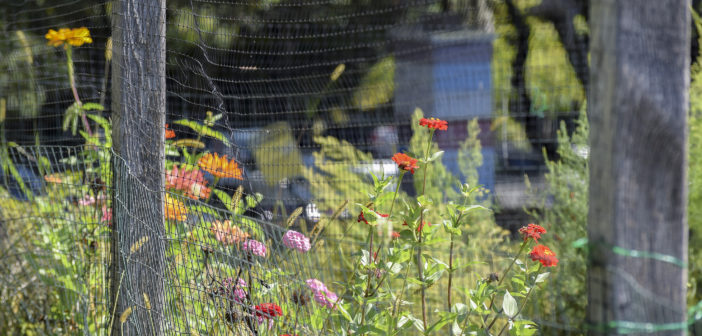FEED, a Global Citizenship capstone project, is working to replace dining services’ vegetables with organic, sustainable ones grown on Lehigh’s campus.
The project aims to start a five-acre farm on Goodman Campus, Ian McDonald, ’17, said. McDonald is an industrial engineering major who works mostly on the logistical side of the project.
The project began with a Mountaintop initiative back in the summer of 2015. Both Jennifer Dwyer, ’18, and Michael Miller, ’17, were part of the original team. Miller is the only one from the original team who’s still working on the project.
That summer, the team set out to create a self-sustaining, carbon-neutral food growing enterprise. It outlined the majority of the organizational structure of what would become FEED.
Miller said they did preliminary energy calculations, and since they wanted the farm to be carbon-neutral, they set up a 16-panel solar array with an output of four kilowatts that runs the water pump at the community garden. He said the pump formerly ran on diesel fuel.
Miller said this was also set up with further expansion in mind, whether it would be a greenhouse or other farming power needs.
McDonald said following the Mountaintop initiative program, two Global Citizenship students decided to pick up the idea and create a more thorough proof of concept as their capstone project. Miller said they fleshed out the budget, operational strategy and did the majority of foundation work.
Miller said the first capstone team worked with Rodale Institute in Kutztown, Pennsylvania, which helps run a small garden for the St. Luke’s Hospital in Bethlehem. He said the hospital uses the garden for its cafeteria.
He said the two-man team then presented its proposal to administration and faculty in May 2016. Pat Johnson, the vice president of finance and administration, was impressed with the project and wanted to follow up, Miller said.
The proposal created by the previous capstone team was vague and only showed the program was possible. This year, the capstone team has run the numbers and laid out an in-depth framework of how this program could work. Their proposal is due Thursday.
McDonald said pending final approval of the proposal, next year’s team will be focused on implementing its framework. The proposal is set up in a way so it can be easily implemented, and the team has already gotten approval from dining services and Sodexo.
He added that most of the capstone projects are two or three kids, but this one is six kids and a support staff.
McDonald said the six students who are involved are split into two groups: operations and education. The operational side focuses on number crunching while the educational side works with faculty and staff to use the farm in the classroom. He said both teams work on the written proposal.
Casey Ching ’17, one of the students on the education group of the project, said the first goal of the her group is to gauge interest. To do so, the students have been speaking with faculty about how their departments could incorporate the farm into their classes.
Isabel Buenaga, ’17, another student in the GC group, said they’ve reached out to 10 different faculty members and all of them have been interested in different ways.
“We’ve also looked into other schools,” Buenaga said. “Yale University also has an on-campus farm. They used it in their Intro to English course, and they worked on coming up with different mechanisms to make the farm more efficient.”
Mark Orrs, the director of Lehigh’s Sustainable Development Program, is one of the faculty members the group reached out to. Orrs said he had talked to Buenaga about incorporating the farm into his introductory sustainable development course.
“We devote one week exclusively as a part of my intro class to food security and food systems,” Orrs said, “but really we talk almost throughout the entire semester about agriculture, agricultural productivity as a driver for economic growth but also one of the leading challenges to sustainable development.”
Orrs said the plan would be to incorporate the farm into the curriculum of his course so students would have the opportunity to gain a hands-on understanding of sustainable agricultural practices, but he also sees the opportunity for larger projects.
Delicia Nahman, Lehigh’s sustainability officer, said she met with the original Mountaintop team during the summer of 2015. Since then, her office has been in constant communication with the student groups to provide them with feedback on their proposals and ensure they are in line with Lehigh’s culture.
Nahman meets with the team approximately twice a semester. She said she thinks there could be minor implementation of the FEED program in the next academic year but that the realistic aim would be the summer of 2018 for a full, operational farm.
Ching said she hopes the farm will be able to operate in a similar fashion to the Mountaintop initiative where people from across disciplines can come together to solve problems.






Comment policy
Comments posted to The Brown and White website are reviewed by a moderator before being approved. Incendiary speech or harassing language, including comments targeted at individuals, may be deemed unacceptable and not published. Spam and other soliciting will also be declined.
The Brown and White also reserves the right to not publish entirely anonymous comments.
1 Comment
Pingback: A garden grows in the food desert: capstone project to address food scarcity in Lehigh Valley – Matthew Cossel